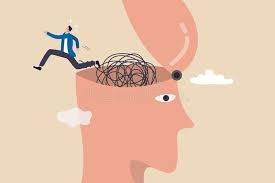Escapism: A Positive or Negative Coping Mechanism?

May 25, 2022
In the midst of quarantine, as I lay awake in my pitch black room, a peculiar thought entered my mind. I wondered what it would be like to drown into the sea of blackness around me. The silence hummed in my ears and turned to a ringing as the darkness suddenly crawled towards me. Engulfed by the overwhelming inky haze, all I wanted to do was disappear to somewhere else. Maybe another world where life was different and more in my grasp, where I could restart and forget. I’m sure this feeling is not alien to most of us.
COVID-19 pandemic. It would be an understatement to say that this event single-handedly changed not only the way we began to view the world, but also the way we began to view ourselves. Quarantined and isolated from those around us, we were forced to look inwards and wipe the dust from neglected issues and problems we faced internally. Not only that, but in dealing with social isolation, we also realized who was there on the other side of the phone and who wasn’t. But dreams during this turbulent time turned into realities, and I found myself wishing for sleep and dreading the daylight. Reality shifting became a popular trend during COVID-19, and these dreams of other alternate realities and universes started to become more tangible than actual reality. A common factor entangled the mess in our minds and the need to get away from the worries of the world: escapism.
Escapism is the coping mechanism that comes with wanting to avoid or “escape” negative emotions and unpleasant circumstances. Escapism is a prominent activity because of the current conditions of our media-consumed society. A person can find a desired tranquility in residing in a fictional world, one where they aren’t overwhelmed with the hurts and troubles of everyday life.
The desire to escape is natural—every human being longs to disconnect from reality at times to restart and rejuvenate. The function of escapism strategies helps us deal with events that are out of our control by placing them in our grasp. Focused on rewarding activities with benefits as a means to distract oneself from reality, escapism can provide an outlet for creativity and inspiration to flow. It can also give a sense of motivation and rejuvenation, therapeutic for doses of mental rest to avoid burnout. It can also reduce illness anxiety disorders, taking one’s mind off the worry of the moment rather than letting these anxieties become consuming.
Because happiness is temporary, escapism causes individuals to disconnect his or her self from the present and focus on moments that make them experience that rush of dopamine from the past. Recent studies have shown that entertainment media causes individuals to experience nostalgia––a mix of emotion triggered by bittersweet memories. As a result, in turbulent times, we may start consuming more nostalgia-inducing media, something clearly evident during the start of COVID-19. This nostalgic media forms a gateway for escapism–– movies, music, video games, books, and even hyper-fixations on people are all different forms of media that can give us a sense of familiarity and nostalgia in times of stress and isolation.
But this false relief is only temporary. Unhealthy escapism leads to the excessive need to run away from unwanted situations and emotions, ultimately leading to denial and emotional numbness. This causes individuals to appear aloof and disinterested with those around them, too enwrapped in their own psychological shelters. In extreme scenarios, escapism used to avoid confronting hardships, such as the death of a loved one, can cause severe escapism dependence in order to cope with the reality of them not being in one’s life anymore. Drastic forms of escapism can lead to psychosis, a loss of reality, where individuals can hallucinate that the person may still be in their life.
Declared a “national emergency,” declining mental health is an ongoing crisis. Heightened by the COVID-19 pandemic, adolescents have shown more consistent rises in anxiety, depression, and stress. As teens return back to school and normalcy following the pandemic, unresolved issues have left them emotionally vulnerable and volatile, adding into the growing number of youth that struggle with mental health issues. Adolescence is a crucial time where teens start to explore and build their own identities–and since they are struggling to find themselves socially and emotionally, they are especially susceptible to external pressures. Following the pandemic and its effects in increasing mental health struggles among teens, there has been an increasing response in escapism tendencies among adolescents to cope with this unfamiliar stress.
Although slipping down the path of escapism may seem like the path of least resistance or the only way out in a seemingly impossible situation, it is important to ground yourself in reality. Eventually the anxieties will return in larger amounts and only make you feel more drowned in your worries. Although not desirable, it is something we have to permanently deal with, and running away from your problems will only cause them to catch up. In light of Mental Health Awareness Month, although it may not seem like it, there is always a lending hand or a listening ear available if you look for it. And know that it is not an individual fight to start facing reality. It’s time to wake up.
















































































































































